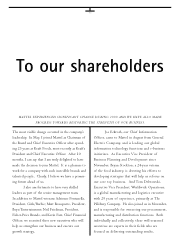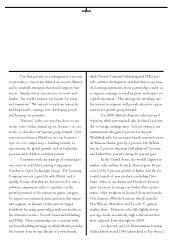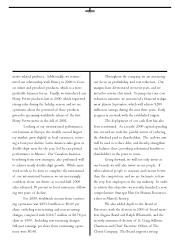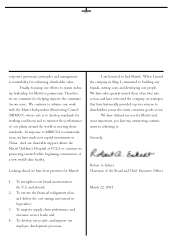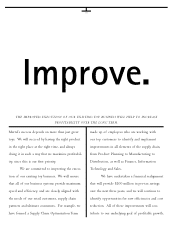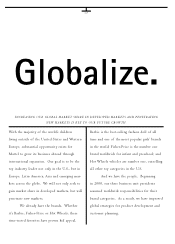Mattel 2000 Annual Report Download - page 4
Download and view the complete annual report
Please find page 4 of the 2000 Mattel annual report below. You can navigate through the pages in the report by either clicking on the pages listed below, or by using the keyword search tool below to find specific information within the annual report.
two
Our first priority as a management team was
to articulate a vision that defined success for Mattel,
and to establish strategies that would support that
vision. Simply stated, our vision is to create and
market “the world’s premier toy brands for today
and tomorrow.” We intend to reach our vision by
building brands, cutting costs, developing people
and keeping our promises.
“Refocus” is the one word we chose to use
on the cover of this annual report, because – in one
word – it describes our mission going forward. Our
new vision refocuses Mattel on its core business –
toys; its core competency – building brands; its
opportunity for global growth, and its leadership
position with children and their parents.
Consistent with our strategy of returning to
our roots, we sold The Learning Company in
October to Gores Technology Group. The Learning
Company was not a good fit with Mattel, and it
quickly became clear that we did not need to own a
software company in order to capitalize on the
growth potential of the interactive games category.
To ensure our continued participation in this impor-
tant segment, in January of this year we forged
worldwide licensing partnerships with two leaders in
the interactive arena – Vivendi Universal Publishing
and THQ. These partnerships are consistent with
our brand building strategy, in which Mattel provides
the content from its vast library of power brands,
while Vivendi Universal Publishing and THQ pro-
vide software development and distribution expertise.
As licensing agreements, these partnerships enable us
to improve earnings as royalties grow, and require no
capital investment. This strategy for extending into
the interactive segment will provide attractive oppor-
tunities for growth going forward.
For 2000, Mattel’s domestic sales increased
4 percent, while international sales declined 3 percent
due to foreign exchange rates. In local currency, our
international sales grew 6 percent for the year.
Worldwide sales for our major brands increased across
all divisions: Barbie grew by 5 percent; Hot Wheels
was up 2 percent; American Girl advanced 7 percent,
and Fisher-Price posted a strong 26 percent gain.
In the United States, the world’s largest toy
market, sales within the Girls division grew 10 per-
cent, led by 9 percent growth in Barbie and the suc-
cessful launch of new products, including Diva
Starz. Sales in our Infant and Preschool division
grew 3 percent as strong core Fisher-Price perfor-
mance offset weakness in licensed character brands.
Our domestic Wheels business, which includes
Hot Wheels, Matchbox and Tyco R/C, gained
market share. However, sales fell slightly below
year-ago levels as relatively high retail inventories
were adjusted down throughout 2000.
As expected, our U.S. Entertainment business
declined from record 1999 sales related to Toy Story 2



